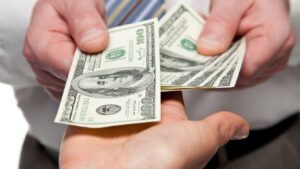https://newrepublic.com/article/162793/estate-tax-inheritance-biden-plan
President Joe Biden has proposed a tax increase that you may not have heard about. It would make the tax code more progressive without extracting even one cent from the wages of the rich or the poor. Nor would it take from the investor any of the dividends or capital gains that accrue from wealth. Nor would it appropriate any portion of that wealth itself. It’s kind of a magical tax, one that aligns perfectly with the American ethos of rugged individualism.
Yet polls have often shown that most Americans, far from wanting to make greater use of this tax, prefer to eliminate it.
I’m talking, of course, about the inheritance tax, also known as the estate tax. Under the current arrangement, when you die, the Internal Revenue Service stops caring how much your assets appreciated in your lifetime. Henceforth, it will care only about how those assets appreciate after your death. In tax wonk circles, this is known as the “angel of death loophole.” Congratulations, dead person! You avoided paying taxes on your capital gains. (It’s a shame you aren’t around to enjoy that.) Any capital gains your heirs realize when they sell those assets will, for tax purposes, be dated only to your death, not to the date the assets were purchased. If they don’t sell the assets, they won’t be taxed at all.
Granted, your heirs still have to pay up to 40 percent in estate taxes (Biden said during the campaign he’d like that to be 45 percent). But that’s only if your estate exceeds $11.7 million in value. No, that’s not a typo. Only very rich people pay any estate tax at all. According to a Bloomberg report, in 2019, the last year for which data are available, fewer than one in every thousand people who died left an estate on which taxes had to be paid.
Biden thinks the capital you accumulate during your lifetime shouldn’t escape taxation. Biden’s American Families Plan would tax unrealized capital gains at death. You don’t need it, right? You never cashed in those assets, but you did cash in your chips, and somebody—your heirs—really should pay taxes on those gains. Under Biden’s proposal, the estate would pay capital gains tax on asset gains above $1 million. Keep in mind that the top capital gains rate (20 percent) is already well below the top income tax rate (37 percent). Biden wants to raise the top capital gains and income tax rates to 39.6 percent, but it’s not clear that will happen.
Why do Americans hate the estate tax? The Republican pollster Frank Luntz made it unpopular a generation ago by labeling it the “death tax.” The idea was that taxing a dead person was some sort of unspeakable desecration. Never mind that according to every contemporary belief system, a corpse has no use for material things. Civilization long ago ceased entombing the dead like King Tut with rare jewels and artifacts of solid gold. As Grandpa Vanderhof said, “You can’t take it with you.”
The “death tax” is really a windfall tax levied on living persons in the enviable position of acquiring wealth that they did absolutely nothing to accumulate. Granted, one reason you were motivated during your lifetime to work hard and invest wisely was that you wanted to provide for your children. Maybe you had a business you wanted to pass on to your kids. The Biden plan exempts those who inherit a family business from paying capital gains tax until they sell it, so there’s no need for anyone to fret about the family farm or the beloved multigenerational family restaurant. Inheritance is a stabilizing force in our society that honors family values. It should be preserved. But if a society is going to tax its citizens, as it must, it’s difficult to imagine a tax that does less economic damage than one on inheritance.
Mitch McConnell has gone predictably berserk over the prospect of increasing the inheritance tax by taxing capital gains at death. More annoyingly, some key Democrats, including House Ways and Means Chair Richard Neal and House Agriculture Committee Chair David Scott, are putting up resistance. But any congressional Democrat who moves to retain the angel of death loophole should be required to shut up forever on the subject of economic inequality.
You’ve heard of the one percent, right? According to Federal Reserve data cited in a 2019 paper by Lily Batchelder and David Kamin, law professors at New York University, nearly 40 percent of the one percent’s wealth “is in the form of accrued and unrealized capital gains.”
I have no problem with one-percenters not paying taxes on accrued and unrealized capital gains if they acquired it themselves; wealth taxes are problematic in all sorts of ways. But to whatever extent the one percent inherits its assets from parents, or leaves them to its children, the capital gains on those assets should absolutely be taxed. Allowing this appreciation in value to go untaxed from one generation to the next is a step toward what Thomas Piketty, in his 2014 book Capital in the 21st Century, called “patrimonial capitalism,” wherein inheritance becomes the only plausible path to wealth because “the dead … are wealthier than the living.” The United States stopped being that sort of society more than a century ago (and in many respects never was). Watching Bridgerton may be fun for some. Living it would be a nightmare for us all.


















